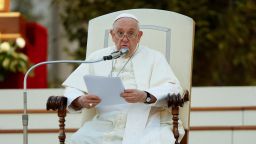With five words, uttered right at the beginning of his pontificate, Pope Francis changed the Catholic conversation about LGBTQ+ people. In 2013, when asked by a journalist about gay priests, the pope famously replied: “Who am I to judge?”
Over the last decade the pope has shifted the church’s tone and approach to gay people, refusing to take a judgmental stance, something that church institutions and leaders had often been accused of doing in the past.
His decision to authorize the blessings of same-sex couples is the most significant development to take place in his pontificate in terms of his outreach to gay Catholics, and follows earlier, more gradual developments. Francis’ latest move will be welcomed by many who have long called for reform in this area, but it is also likely to face significant pushback from parts of the church deeply opposed to his vision.
According to the Catholic Church, sex is only permitted between a man and woman who are married. The church’s official teaching describes homosexuality as “intrinsically disordered” – a wording that some reform-minded Catholics want to see altered – but also that gay people must be treated with “respect, compassion and sensitivity” and all “unjust discrimination” be avoided.
Francis, while not formally changing doctrine, has repeatedly sought to place the emphasis on the latter. He has told a gay clerical sexual abuse survivor that “God made you like this. God loves you like this,” said that LGBTQ+ people are “children of God,” and recently invited a group of transgender women for lunch in the Vatican. He has also praised those ministering to gay Catholics, who have often faced opposition from inside the church.
But the pope’s approach goes beyond words and gestures and includes more substantial shifts to the church’s positions. The 87-year-old pontiff has given his support to the legal recognition of same-sex couples, something the Vatican has opposed in the past, and has spoken out against the criminalization of homosexuality before and after a trip to Africa.
His latest decision on blessings does not change Catholic opposition to same-sex marriage, yet it marks a new moment in the church’s outreach to gay people. For Francis, it is a question of balancing long-held doctrine but translating that teaching to the everyday realities of people’s lives. Developments of the doctrine are also possible, and the pope insists the church must not become rigid or judgmental but welcome everyone.
“One should not prevent or prohibit the church’s closeness to people in every situation in which they might seek God’s help through a simple blessing,” the latest ruling reads. “The grace of God works in the lives of those who do not claim to be righteous but who acknowledge themselves humbly as sinners, like everyone else.”
Almost every Christian denomination has experienced deep disagreement over blessings and marriages of same-sex couples. The Vatican declaration came a day after the Church of England, after years of debate, began to offer blessings of same-sex couples in churches, although it will not bless gay marriages.
The Catholic Church has been seen as the least likely denomination to shift its position and its ruling on blessings states these should be done informally and not within church services.
Nevertheless, pressure has been building for the Catholic Church to consider the blessings of same-sex unions and in Germany several priests have already begun holding ceremonies blessing gay couples.
Bishop Georg Bätzing, the leader of the German bishops’ conference, welcomed the latest ruling. “It is good that this treasure for the diversity of lifestyles is now being unearthed,” he said. “The practice of the Church recognises a variety of forms of blessing.” Cardinal Blase Cupich, Archbishop of Chicago and a Francis ally in the US church, described the move as a “step forward.”
But there is also likely to be some significant pushback. Bishop Joseph Strickland, who was recently removed by Francis from the leadership of the Diocese of Tyler, Texas, has already urged bishops to say “no” to the pope. The ruling does not order clergy to offer blessings, and it’s possible some will refuse requests.
On the other hand, the pope is unlikely to be perturbed by opposition and will not shy away from the hot-button topics.
A recent church gathering in the Vatican – a synod – shied away from using the term “LGBTQ” Catholics after heated internal debate about the topic. Yet it also made the significant admission that the church’s teaching on sexuality and identity had not adequately taken into account human experience and the sciences, saying that “greater precision and further study” was required.
The implication is that if this happens, it could lead to a re-configuring of Catholic sexual teaching, including homosexuality. Francis has not gone down that route, but the pastoral openness he’s modelled to gay people lays the foundation stones for even more significant reforms in the future.




